
April 3, 2011
 Notes From A Trip To The Center For Cartoon Studies
Notes From A Trip To The Center For Cartoon Studies

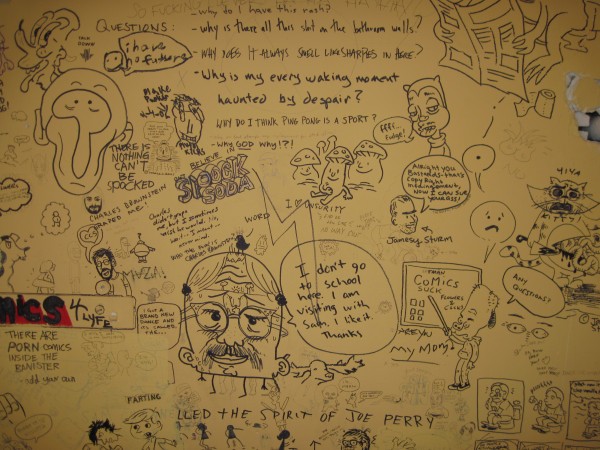
*****
By Tom Spurgeon
* these are notes jotted down during, around and concerning my participation in Industry at the Center For Cartoon Studies (CCS) in White River Junction, Vermont.

* let's face it: CCS is located in the ass-end of nowhere. Any connection it has to the civilized world is wildly overstated. As
CR operates in a desert-town equivalent of its White River Junction, getting to CCS took two days: a three-hour drive to El Paso the day before because the day-of shuttle doesn't get there before my flight leaves, an overnight stay in a hotel within sight of North American happy-town Juarez, a two-hour flight to Dallas, a three hour flight to Boston, a long shuttle bus drive to a town near White River Junction, and a short car ride from friendly Jon Chad (above) and Colleen Frakes to the town itself. I once went from Chicago to Rome in what seems like less time and certainly fewer changes of seats. That's the transportation grid post-9/11, though: expensive and long from any place that is not a direct hub to a direct hub. If you want yet another reason why regional cons are becoming of greater and greater importance, spend one of those 15-hour days moving in plodding fashion through America's airports, bus systems and highways.
* any travel is worth it, of course. My only suggestion is that anyone going from outside of the region might want to build an extra day into any trip to CCS because of the relative length of time you might need to get there. You
want to make a trip to CCS if you have an excuse for doing so. I was really honored and pleased to be among those invited in for their yearly Industry Day, held on March 31. I had a great time. Surely comics is as alive in this out-of-the-way small Vermont town as in any comics community on the planet (Frakes estimated the community's overall size at about 60). For this most ephemeral and disposable of art forms, White River Junction is one of those places where working, thinking about, practicing comics dominates and changes lives. It's hard not to be excited just being there, on the ground.
* I have a personal soft spot for CCS as well, in great part because James Sturm first publicly announced his intention to open a school in the pages of our long-ago
Comics Journal interview -- an interview otherwise best known and in much less savory fashion for James drawing himself naked on the front cover.

* reflecting on my way out, I remember that the interview with James was conducted after I had moved to Silver City, New Mexico. This means that James has gone on this entire, multiple-person, life-altering journey while I've made almost no significant life changes whatsoever. Everyone in alt-comics secretly hates James Sturm some variation of this reason: while you're making incremental changes in your daily habits, James Sturm is creating institutions that change the directions of other people's lives. Luckily, he's also too nice to remember to hate him in person.
* my room was in the Coolidge Hotel, as I'm pretty sure most of the school's guests are. It's a block away from the school. It's a nice, older hotel, of the kind you still find in a lot of small North American downtowns. The room was reasonably large, featured sealed windows and offered up an electric fan in the clothes bureau. The cable TV lacked ESPN but had a channel where Boston radio personalities are filmed discussing more regional sporting issues. Someone suggested that over half the rooms in the hotel are given over to permanent residents, but it didn't feel like that kind of place at all. When they were bored, the front-desk employees seemed to make use of the lobby Internet. It was a laid-back place.

* I stepped over to the school on Thursday just in time for some sort of bagel-driven mixer, in a front room that contained an exhibit of Vermont cartoonist laureate James Kochalka, who with the possible exception of Reed Whittemore is surely the only laureate of any kind to pen rock songs about his wiener. James' originals are modestly sized and crisp-looking, and I derive a lot of pleasure out of looking at James' art in just about any format.
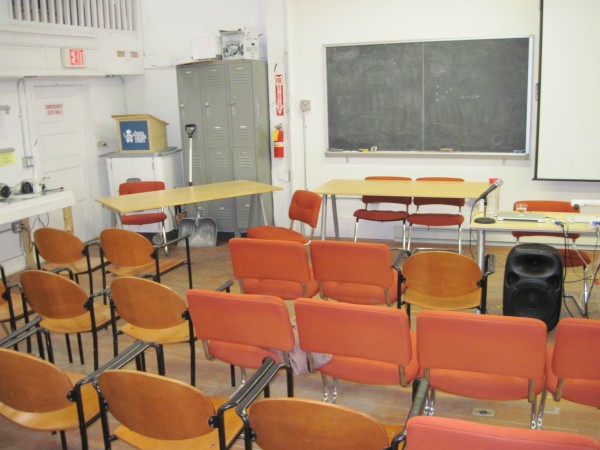
* we had a good time on the morning's industry panel, the main reason by a factor of one million I was brought to Vermont. On the panel were Charlie Kochman of Abrams, Barry Matthews and Leon Avelino of the excellent boutique comics alt-publisher Secret Acres, and agent
Bernadette Baker-Baughman, who recently moved from her own agency in Portland (Baker's Mark) to be a part of one with offices in New York City and the Hudson Valley (Victoria Sanders).
* these were all-new panel people for me, by which I mean I'd never been on one with any of them before, and hadn't seen them speak at any length from a seat in the audience. I didn't know Leon and Barry at all, could boast of only a tiny bit of familiarity with Charlie, and had met Bernadette once five years ago at a First Second dinner in San Diego. Thankfully, all four were whip smart, articulate and funny. I'm certain there were people in the audience who counted each one as a personal favorite; there were no weak links. My goals going in were to keep the conversation moving between the various audience members, focus on the positive (because there are definitely positives right now, and because it's easy to slip into scorched-earth mode when discussing the state of the industry) and accentuate any practical information that might be available to the students. I had a great time, and I hope it provided some insight for the students into how things work in a way they don't have to be intimidated, anxious or afraid moving forward.
* I also personally learned a lot. A few things that I don't think anyone would mind me share included:
+ the trouble at the Borders bookstore chain has been a punch to the heart of the book publishing industry's culture, an event so big that it's marshaled not only the appropriate response to its inherent and obviously major implications but has seemed to have let loose a torrent of pent-up worry about the changing nature of publishing.
+ Kochman met Jeff Kinney when Kinney handed Kochman one of several packets he made of the Diary Of A Wimpy Kid material, at the very first New York Comicon. Kinney's an example of someone who approached Kochman in proper manner at one of the shows: engaging him at a time during the show where Kochman wasn't too busy, with professionally prepared material that was ready to be published rather than in some early stage of preparation. Kochman was far more bullish than the Secret Acres guys about using appearances at shows to take on material for consideration and to generally meet new artists. Leon and Barry would rather find material on their own or receive it in a way they have a paper trail to follow back to the cartoonist -- as they also have a commercial interest at conventions in terms of moving books, their reticence to look at work for publication right there on the floor seems reasonable to me. I mention this not because there was a lot of drama involved, but it was one of the few cases where there was a clear distinction in practice. An amazing thing about the panel general is how much common ground the panelists were able to stake out in pretty rapid fashion.
+ someone actually sent Charlie a shoe when applying for a position with Abrams, a shoe that included a note that said the sender "wanted to get a foot in the door." Besides making a roomful of students groan at the idea, and being a sterling example of the fine American tradition of prop comedy, the move didn't seem to do the applicant much good. There was a bit of talk about professional conduct by cartoonists and other folks that indicated there was a flip side to having people remember your name, and that ultimately the work speaks for the cartoonist.
+ for picking an agent, if you want to go the agented route, the panelists suggested looking at the other clients being served but also to pay special attention as to where those artists being represented are having their books placed by the agent.
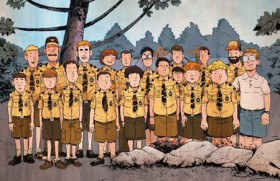 + Secret Acres mentioned that their upcoming Troop 142 comic from the cartoonist Mike Dawson was an example of a work that was blindly submitted and that it was pretty much going to be their first book that wasn't really a debut work. The reason they have done so many debut works, incidentally, is from the simple need they had as a newer company to build a list. They had been to CCS before, and had once left with a box full of work that led to offers and contracts with a variety of then-CCS students. All three panelists talked about the advantages of working with creators across multiple projects, and how that kind of fruitful, long-term relationship is a goal in what each of them does.
+ Secret Acres mentioned that their upcoming Troop 142 comic from the cartoonist Mike Dawson was an example of a work that was blindly submitted and that it was pretty much going to be their first book that wasn't really a debut work. The reason they have done so many debut works, incidentally, is from the simple need they had as a newer company to build a list. They had been to CCS before, and had once left with a box full of work that led to offers and contracts with a variety of then-CCS students. All three panelists talked about the advantages of working with creators across multiple projects, and how that kind of fruitful, long-term relationship is a goal in what each of them does.
+ Bernadette indicated she felt most comfortable right now selling YA material and non-fiction, although I could tell she didn't want to limit herself even in a casual statement on an industry panel to only representing much material. She described as collegial and supportive the general relationship among agents that specialize in cartoonists and comics-related representation.
+ as far as the industry itself, one thing that popped for me was that a couple of the panelists felt that there had been a drop in sales starting a year ago, just in terms of general demand from comics retail. There was also deep concern for the infrastructure of comics as represented by companies like Diamond, where inefficiencies in the way information is deployed and the books themselves are processed adds a level of strain and cost to the system that a lot of people can't afford. Although I came to the panel wanting to talk to the Secret Acres team about their use of comics sales rep Tony Shenton, I was surprised to hear that Kochman and Abrams had recently hired Shenton as a way of facilitating greater sales of their backlist into the comics Direct Market.
+ the basic Direct Market quandaries were noted: that comic book stores can be amazing, but many aren't, particularly for those with any interest in comics outside of a narrow take on superhero work; that there are more great stores than ever but whether or not there has been a proportional boost in sales of certain comics due to these great sales was either unknown or doubtful; that the best stores have roots in both the local artistic community and great deal of flexibility when arranging promotions and events with visiting creators. It wasn't too far from the kinds of conversations comics folks routinely have over convention dinners.
+ Steve Bissette noted a big difference in the market right now in broad terms was that kids don't have access to material in the same way that they used to: as something they could access with their own money. While I wondered out loud if the days of kids hauling into their homes a stream of pop-culture was as gone as the days of the day spent playing somewhere in the neighborhood without any supervision whatsoever, most of the panelists were quick to cite on-line media as a way for kids to have some control over making comics-related entertainment choices.
+ we talked about hand sales. For Secret Acres the ability to get out there to shows like last year's Brooklyn Comics And Graphics Festival is vital to the way they do business and is money they can count on making. Whether or not these kind of sales represent a way to make for deep industry infrastructure problem was a bit more open to debate -- Charlie noted that with a book like Boilerplate, the fact that authors Paul Guinan and Anina Bennett (whom I believe are represented by Bernadette) are so incredibly good at representing themselves and their projects at a show would make a difference for any publisher in terms of not-insignificant sales and the kind of buzz that a successful sale of books at a convention might provide.
+ I think it was Leon that noted that a difference between right now and 15-20 years ago is the relationship that many publishers have with printers, as art book and comics have a definite tactile appeal that has made many such businesses consider those books a greater part of their ability to survive as businesses over the next several years. The general quality of the art direction on books was also cited as a major difference, although maybe not a universal element as of yet, and how this plays to the basic demand on publishers to be great facilitators of their creators' wishes in getting the books out there looking as lovely and sharp as possible.
+ finally, the digital conversation was a lot briefer than I thought it was and went in a couple of strange directions. Bernadette noted that many publishers -- this was confirmed by Charlie -- want to include digital rights as part of their contracts and fold comics works into their existing or about-to-exist digital programs. Charlie and Bernadette both noted that there are a few creators that are asking to keep those rights as part of their negotiations, in some cases because they feel they can do a better job themselves. For their part, Leon and Barry hinted at some sort of digital initiative in the works regarding a number of publishers.
* one thing that Charlie Kochman went on the record about in an informal setting later on that day is the state of Abrams' Frank Young/David Lasky Carter Family biography, which had been delayed while rights issues to the use of some lyrics were sorted out. After much discussion and some frustrating negotiations with the objecting parties, Abrams and the creators have decided to present the book in a way that those particular lyrics aren't needed, so the book remains a go. However, it won't be out until Fall 2012 because 1) there is still a bit of this rewrite work to be done even as the creators are deep into subsequent projects and 2) in Spring 2012 they'll have a book out that could conceivably compete for attention.
* I quite liked the Secret Acres guys, and it was easy to match the eclectic nature of their catalog-to-date to the young New York publishing veterans they naturally seemed to be. If you want a pair of cool publishers to handle your work, there you go. One thing I found really humorous, and maybe I'm just watching too many Marvel related movies, but Leon reminded me a lot of Liev Schreiber and Barry of Clark Gregg. Although again, maybe I was just tired.
* I asked after David Axe, one of Bernadette's clients -- she said that he's been working on both fiction and non-fiction pieces, and her aim is for him to settle down with a company that will create a small library of works around his comics.
* I'd never met Steve Bissette before, and I would have made the trip just for that opportunity. Everyone on campus was so kind and solicitous in terms of the overwhelmingly positive way with which Bissette engage with the students. We talks about some industry manners, and Bissette's massive libraries of books and material collected -- literally tons and tons of stuff.
* I liked the work that I saw, as a general rule. Some of it was more accomplished. All of the students did a halfway decent job of tamping down their influences, and most evinced a healthy self-critical function that I think will serve them in a variety of ways if they continue to move forward. There were no Lords Of The Basement bristling with the energy of "I'm here!" that you find at a lot of shows. It might be worth noting that many of them hadn't done a lot of shows, and that most of them were very excited and even scared to be exhibiting at MoCCA later on this month.
* portfolio evaluation is not one of my roads less traveled. I ended a lot of sessions with some variation on "And to conclude, I suck at portolio evaluations." The problem for me is that it's hard to see the cartoons two or three years down the line from the vantage point of the work that was presented, making it extremely difficult to tell if individual cartoonists were on the right track or not. It's also difficult, given the variety of opportunities any single cartoonist might choose to pursue whether or not how they were approaching the page was adequate to the task or not. A few elements I saw repeated were 1) a generally higher level of craft across the board would have had significant benefits for every single cartoonist from whom I was presented work; 2) a lack of sophistication in where the eye moves, particularly in caption placement; 3) furious but not necessarily clear page design, indicative of an approach that stresses moment to moments within the page but not the page as its own discrete unites. Mostly they sat around and told me which evaluators were mean during last year's industry day, which gave me a chance to make up outrageous lies about them.
* the panel guests and portfolio reviewers, sans a departing Bernadette, had dinner at School Director Sturm's lovely home, trading war stories about comics luminaries and talking about who in comics had collected what kind of material and at what cost. It was an early 20th Century building, the kind where you can figure out where the original house stood and what was built onto it at a later date.
* one of the things I did not know is that not in no graduating class thus far have 100 percent of the students made it through the thesis evaluation process.
* the mixer/karaoke night held at the local drinking establishment was pretty crazy-looking, although as mentioned Bernadette had gone home by then in advance of a possible snowstorm and Charlie skipped it altogether. James Sturm stayed around for an hour or so, while Barry and Leon were still in the place when I left, nowhere near close to shutting things down. Leon even sang a number with one of the students -- appropriately, it was a song with which I had no familiarity, as I'm 143 years old. In the room next door to the karaoke room a band was planning on open mic night; one of their members was legendary webcomics cartoonist Cat Garza, to whom I spoke for a few moments while he was outside taking a break. Vermont is a long way from South Texas. It was good to see him, though. He has a little girl.
* I had a great time out at the bar, although I'm pretty sure anyone to whom I spoke might have come away feeling I was a bit deaf and have every reason for thinking this. A bunch of the area alumni showed up between 11 PM and midnight, and I got to briefly meet the cartoonist Chuck Forsman.
* I saw the rest of the campus on a tour Friday. James Sturm declared it "part of his job," I think to make make me feel better about wasting so much of his time.

* the library was pretty wonderful-looking, as you might expect: a bit smaller than I maybe thought (although a chunk of it is off site) but certainly possessed of the required fancy volumes and slew of mini-comics. I was told they have the hardest time processing single-issue comic books, which makes total sense.
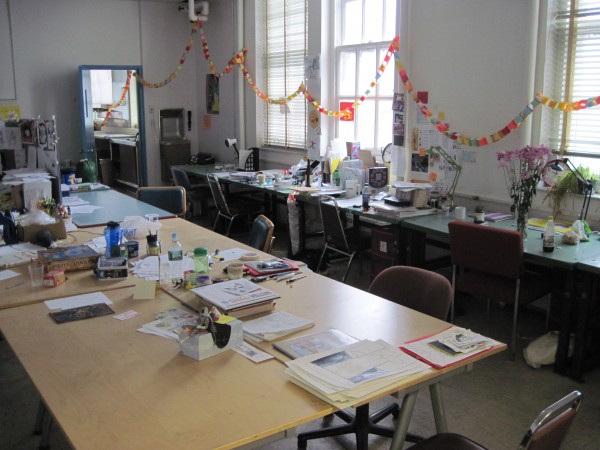
* the senior studios were fun. Every second-year student gets one, in an older building with cryptic notes about not setting foot into any room on the first floor. I imagined the students working quietly like assassins and then posting their finished pages in a kind of ongoing, nerd-macho throw-down. The Denys Wortman archives across the hall would have been stunning and remarkable just for the supplementary material on-hand -- any time you get to hold a vintage
Annie strip is a very good time -- but for the amount of material on-hand from Wortman the room was a bit mind-blowing. Sturm reiterated a point I've heard him make in public, that one of the big lessons about reissuing a book on Wortman and doing a show in support of that books is how quickly and completely the once very prominent illustrator and comics-maker disappeared from public view. We are all here only briefly, and the kind of permanent impermanence of a school is a great metaphor for a lot of those feelings.

* Sturm has an office and studio up the street from the school, in a building that I believe was the town's first grocery store. The room, with plenty of light, built-in bookshelves and admirably high ceilings, was festooned with all sorts of odd posters and Sturm-favorite comics. There were plenty of Jack Kirby-era
Thor comics, for example. Sturm offered up one of the more unique takes on Vince Colletta I'd ever heard, that he liked what he did to Hercules' face in those great Thor Vs. Hercules battles, making the Prince of Power look slightly more effeminate than many artists might have. Sturm had a huge stack of
Quincy tear sheets, which is certainly more
Quincy I had ever seen in my life up to that point. The studio allows Sturm to move away from his in-house office to a place he can get more work done, but at the same time remain accessible to the students.
* it's funny that the first take on this report was so full of typos -- this draft probably is, too -- as people complimented
CR on its reasonably clean text several times that weekend. If I didn't know better, I might think I misspelled a bunch of words and several people's names just to avoid the pressure of being thought of that way. It really is that I just suck at spelling.
* Charlie Kochman is a note-taker.
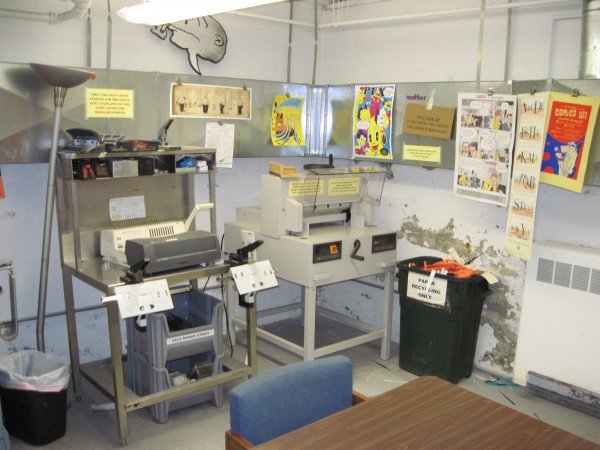
* during one more stop at the school, I went downstairs to the basement/lab with all the equipment -- from copiers to paper cutters to silk-screening implements. This was one of the few spaces at the school that was larger than I'd imagined. It seemed like the kind of place you might find students at 1 AM on a Tuesday night, or suddenly and inexplicably find Brian Ralph hard at work. The bathroom was decorated with cartoons -- not a rare thing at any art school, but it was funny to be standing there with James Sturm laughing at crude, insulting pictures of James Sturm, even though it was clear they weren't darkly serious. That's a section of bathroom wall up top.
* two weird conversational elements came up more than once in a way that made me notice: three different people compared old comic books they liked to comfort foods involving cheese; a few people at different times expressed admiration for Lucy Caswell. This is way more flattering to Lucy Caswell than it is to old comic books or cheese. During a moment not one of those Lucy Caswell conversations, Sturm mentioned how great a time he had at last Fall's OSU festival -- the one they have every few years -- and that Patrick McDonnell in particular spoke eloquently and well at that event during the parts that honored Jay Kennedy.
* I ran into Alec Longstreth a couple of times when I was there, and expressed admiration for his color work on Aaron Renier's
Walker Bean graphic novel. He mentioned that another one of those was apparently on the way, something that I'm not sure I knew. He also mentioned that somewhere on campus he and another cartoonist had placed pinball machines, and that a portion of their proceeds went to a small scholarship. Pinball, apparently, has replaced ping pong as the diversion of choice among students. I also briefly ran into Jason Lutes, one of the best people in comics, and more
Berlin is imminent. I'm trying to think of anything else I heard publishing-wise, which wasn't much as I didn't press. Someone not Charlie Kochman mentioned that Kochaman and Abrams were working on a Rube Goldberg book. Center For Cartoon Studies has one more book in its historical-figure series -- the series with the Satchel Paige book and John P. doing Thoreau. There should be many more
Adventures In Cartooning books, as that series has done well -- James Sturm says it's the most successful book he's ever done.
* overall, I greatly enjoyed myself, and left impressed with the place. There was a positive energy there that wasn't simply the raised body temperature of something in its infancy. CCS looked and felt like it was settled in for the long haul, and was already a bigger and more complex organism than I imagined. Although Sturm did mention the miracle of some of its financial history, the way that fundraisers by cartoonists like Garry Trudeau and Art Spiegelman were a big help at the times they took place and that certain one-time donations from patrons were just as important and big, you got the sense that the financial model of the school itself was a satisfactory springboard for a lot of their day-to-day functions. Unless they completely fooled me, I expect to hear about that place for years to come.
* my thanks to James for the invite, the enormous hospitality shown by all the students; everyone whose name I misspelled on a first draft; the panelists for being smart and articulate and optimistic; Jon Chad, Colleen Frakes and Pat Barrett for the rides, and everyone else I met on an outstanding Wednesday/Thursday/Friday.
******
*
The Center For Cartoon Studies
******

******
******
posted 5:06 am PST |
Permalink
Daily Blog Archives
November 2019
October 2019
September 2019
August 2019
July 2019
Full Archives


